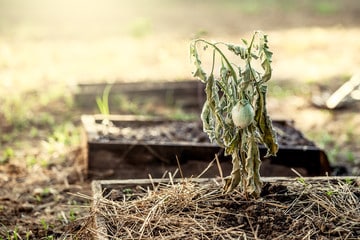This post contains affiliate links.
Everyone knows about the mysterious disappearance of Honey Bees called “colony collapse disorder”. Everyone says it is important to keep bees. So I was just wondering, why is beekeeping so important?
Bees are responsible for pollinating more than 80% of all plants that have flowers including the vast majority of agriculture crops. Without bees, several foods consumed by humans would become extinct. Wild honey bees have almost disappeared as they compete for nectar and pollen with commercial bees farms. Commercial bee farms are vulnerable to mass destruction if a bee farm becomes infected. Plus, bee pollination of non-commercial plants provides nutritional habitat for wild animals and other helpful insects.
What crops would disappear if bees disappeared?
I scoured the internet for an answer to this question and this is what I discovered:
- Almonds: California is the world’s supplier of almonds. This seems strange to me because almonds require an enormous amount of water and California is a high drought probability state. Just one almond requires over 1 gallon of water to bring it to harvest. This will become an increasing problem as more and more gluten intolerant and ketogenic diet people consume almond flour as the primary replacement for grain flour. The experts say almond crops are 100% dependent on Honey Bee pollination and almond farmers use about 50% of all Honey Bees in the entire United States to pollinate their crops.
- Avocados: Another California crop. California produces about 90% of all avocados sold in the United States. Avocados are less thirsty than almonds but still require a significant amount of water. It takes about 75 gallons of water to harvest one pound of avocados. Consumption in the United States has quadrupled over the past in the past 10 years. Because of California’s limited water supply, more and more avocados are being imported from Mexico, Peru, and South Africa. Get ready to pay more for that tasty guacamole!
- Apples: Americans consume over 10 billion apples every year. About 60% of apples consumed in the United States come from the state of Washington where water is not a problem. Honey Bees are not the only pollinators of apples but without Honey Bees, the apple crop would be greatly decreased, enough so that demand would totally outpace supply. Apple pie, an American icon, would be a rare, expensive treat.
- Blueberries: Blueberries are native to North America making them very important to our agricultural heritage. Maine is the primary location of blueberry production and bees are responsible for about 90% of all pollination. Blueberry extinction would eliminate a fruit that is one of the great sources of antioxidants, an important factor in disease and inflammation control.
- Cherries: Another Washington State crop, producing the vast majority of cherries consumed in the United States. Once again Honey Bees are responsible for pollinating about 90% of all cherry crops. Without Honey Bee pollination, cherries would not be a viable commercial crop. George Washington, at age 6, famously chopping down his father’s cherry tree with a new gift of a hatchet. Wouldn’t it be a shame to not have that great story to teach our children the importance of truth! Oddly, apples are synonymous with George Washington, are grown primarily in the state of Washington, but I can not find any evidence George Washington was ever in the state of Washington.
- Orange: This is another crop that 90% of production is attributable to Honey Bee pollination. Although orange crops are much less region growing specific, Honey Bees are still responsible for about 90% of the required pollination for crop production. Hard to imagine never having orange juice with my breakfast anymore. And another good source of antioxidants gone!
- Grapefruit: This fruit is also almost entirely dependent on the Honey Bee for pollination. This fruit is also considered a high antioxidant fruit but be very cautious with this fruit because it does interfere with a lot of prescription medications, making them more potent or less potent, depending on the medication. If you are getting non-consistent results with medication, be sure to check the effect grapefruit might be having on your specific medication. The logical person to ask for advice would be your doctor but your pharmacist will be much better able to answer your questions and is much more accessible than your doctor.
- Pumpkins: Another North American native fruit. Pumpkins have several pollinators, however, Honey Bees do the bulk of the work. October and November American holidays would not be the same without this unique fruit.
- Cucumbers: This is one of the backyard gardeners favorite vegetable to grow but they would become almost extinct without Honey Bee pollination.
- Onions: Onions, celery, and carrots are the classic triads for vegetable stock. They are also the bases for many sauces and soups. Can you imagine beef stew without onions? Hamburgers without raw or grilled onions? The loss of the onion would have a significant impact on a lot of culinary delights!
- Animal Feed: Not only do Honey Bees pollinate vegetables and fruits humans consume, they also pollinate crops farmers feed to their livestock. Without bees, not only would humans lose a very large portion of carbohydrates intake, we would also lose a significant source of protein and fats we need because of the farmer’s inability to feed their livestock.
Honey bees are very important to many more fruits and vegetables than listed above, estimates are Honey Bees pollinate the vast majority of the top 100 fruit and vegetable crops in the United States.
What is “Colony Collapse Disorder”?
Colony collapse disorder is not just an American problem, it is a worldwide epidemic. As such, we can not simply import our way out of the shortage of fruit and vegetable supply if Honey Bees disappear.
Scientists around the world have not been able to identify the specific cause of colony collapse disorder. One of the confusing aspects of colony collapse disorder is that the bees simply disappear. There are no bee corpses to autopsy to identify any pathogen, they simply disappear. There is no evidence at the hive to suggest predators or swarming as an answer, hence the term “disorder” as opposed to “disease”. Scientists just do not have an answer yet to the cause of this disorder, however, the good news is that colony collapse disorder is purported to be in slight decline over the recent past.
Recent interesting research on the possible cause of colony collapse disorder:
Recently a Ph.D. thesis has speculated a possible cause of colony collapse disease and has questioned the consensus of how the varroa mite impacts the Honey Bee.
The long-term consensus has been that varroa mites attach to a Honey Bee and sucks the bee’s blood.
The Ph.D. research thesis has uncovered a different, hereto unrecognized impact, the varroa mite has on the Honey Bee. Upon dissection of the Honey Bee infected with varroa mite, it was observed there is a “hole” in the Honey Bee’s body fat directly under the varroa mite attachment to the bee.
Other research has shown that Honey Bees flying less than 4 miles round trip from the hive gain weight while bees doing round trips greater than 4 miles lose weight. These studies show flights less than 4 miles round trip get their energy from the nectar they are gathering for the hive, however, round-trip flights greater than 4 miles must draw on the Honey Bee’s fat reserves to complete this longer foraging trip.
My hypothesis would be that Honey Bees simply run out of energy to fly while on foraging trips longer than 4 miles round trip. They die on the ground at some distance from the hive because they do not have enough energy source to make it back to the hive. This would explain the “disappearance” of the bees without any bodies to autopsy. This would most likely happen during the Derth (non-nectar flowing time between spring and fall nectar flows). During the Derth, Honey Bees must fly much longer distances to gather the same amount of nectar and pollen that they would be able to gather in the 2 nectar flows annually.
Why is backyard beekeeping important?
- Beekeeping has become a large commercial enterprise. The commercial beekeeper’s primary source of income is hive rentals to agricultural businesses that need the bees to pollinate their crops. Beekeepers then transport their beehives all over the United States to pollinate farmers and orchard growers crops.
- Bees are very regional creatures and do not do well in non-native environments. As prior stated, almond growers in California use about 50% of all the bees in the United States, so bees are transported on semi trucks across several different climate zones as they travel to their final destination. Once the bees reach their target destination, the climate at that target destination will be very different than the bee’s prior environment.
- During transportation, the bees are kept alive by feeding them corn syrup. The bees have no access to nectar while in transport, which can be several days. This practice is not healthy for the honey bee and the honey produced from this practice is less than optimal, however, commercial beekeepers are not concerned with the quality of the honey; they are making their money from pollination of crops.
- The increased use of pesticides on the crops being pollinated by commercial beekeepers is estimated as killing 30% of the bees.
- This means the commercial beekeeper’s bees will have less than optimum health and strength. Since 80% of bees are captives of commercial beekeepers, the overall health and strength of 80% of bees in the United States are much less healthy than bees raised and housed in their native climate and environment. Backyard beekeeping is a strong benefit and stop-gap to the overall health of Honey Bees.
What benefits would I receive from beekeeping?
- The consensus is, backyard beekeepers experience a 33% increase in their vegetables garden and flower bed production.
- Consuming honey produced by backyard beekeeper’s own hive can significantly reduce the backyard beekeeper’s allergies to local pollen.
- Medicinal benefits of honey, propolis, pollen and bee venom include reduction of joint inflammation/pain, as an antibiotic for wounds/burns/fungal infections, and reduction of upset stomach/diarrhea/vomiting.
- The profits from the sale of honey, propolis, pollen, beeswax, Queen bee raising, nuc sales, and even the sale of complete hives.
- And of course, the benefit of feeling good about contributing to improving the environment.
What can I do to help the bees?
- Become a beekeeper.
- Don’t use chemicals.
- Start a compost bin at home and use the compost instead of fertilizer.
- Use mulch to control weeds instead of chemical.
Honey bees may be the hardest working animal on earth.
Let’s make sure they are around for another 20 million years.
Happy BeeKeeping
Paying It Forward
Backyard Visitors participates in affiliate programs which compensate us for referring traffic.


